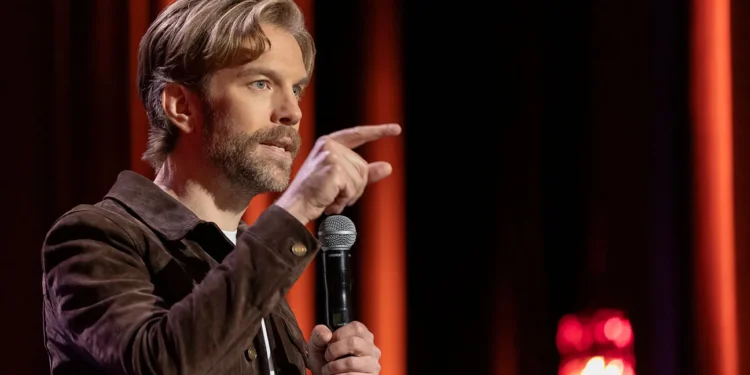Understanding Anthony Jeselnik’s Unique Comedy Style
Anthony Jeselnik is a comedian unlike many others in the comedy world today. Known for his razor-sharp wit and unapologetically dark humor, Jeselnik has carved out a niche where he confidently treads the fine line between shock and laughter. What sets him apart is not just the content of his jokes but the way he delivers them—with a deadpan expression and meticulous timing—that often catches audiences off guard. This unique style makes his comedy memorable and, at times, highly controversial. Let’s deep dive about Anthony Jeselnik’s Most Controversial Jokes.
Jeselnik’s brand of humor doesn’t shy away from taboo subjects such as death, tragedy, and social issues, which many other comedians avoid. Instead, he confronts these topics head-on, often flipping them into biting punchlines that provoke strong reactions. This willingness to explore the darkest corners of humor has sparked debate, with some praising his fearlessness and others accusing him of insensitivity. Regardless of the stance, it’s clear that controversy plays an essential role in his comedic identity.
In the realm of stand-up comedy, controversy is not just a byproduct but a tool—a way to challenge societal norms, evoke reflection, and push audiences out of their comfort zones. Anthony Jeselnik embodies this philosophy fully, making his most controversial jokes a fascinating subject to explore. This article will count down Jeselnik’s top 10 most controversial jokes, shedding light on why these particular bits have stirred so much conversation and what they reveal about the evolving landscape of comedy today.
What Makes a Joke Controversial? The Boundaries Jeselnik Pushes
Controversy in comedy is often about pushing boundaries — stepping into territories that society deems sensitive or taboo. Anthony Jeselnik is a master at navigating these boundaries, using dark humor, irony, and shock value to create jokes that not only entertain but provoke thought and debate. But what exactly makes a joke controversial?
First, a controversial joke typically involves subject matter that touches on sensitive issues — topics like death, race, religion, disability, or tragedy. Jeselnik’s comedy frequently revolves around these themes, but unlike many comedians who soften their approach, he embraces a stark, unfiltered style. This boldness makes some people uncomfortable, which is precisely the point: to challenge social conventions through humor. Learn more
Jeselnik also employs irony and unexpected punchlines. His jokes often lead audiences down a familiar path before delivering a surprising and, at times, unsettling conclusion. This misdirection heightens the shock factor, amplifying the controversy.
For example, Jeselnik might take a subject like cancer, a deeply emotional and personal topic, and frame it in a way that forces laughter in a situation where people might otherwise feel sadness or discomfort. While many see this as offensive, others argue that Jeselnik’s jokes help society confront difficult realities with humor, providing a unique coping mechanism.
To sum up, the main boundaries Jeselnik pushes are those of social sensitivity and emotional discomfort. His controversial jokes are designed not just to shock but to make audiences question their limits of humor and the role of comedy in addressing difficult topics.
Anthony Jeselnik’s Most Controversial Jokes Top 10: The Countdown
Now, let’s dive into the heart of the matter — Anthony Jeselnik’s top 10 most controversial jokes. Each joke below is accompanied by context and public reaction to give a full picture of its impact.
10. The Cancer Joke
“I saw a woman at the supermarket with a little girl who had cancer. I felt bad for the mother, so I said, ‘Your daughter’s very brave.’ The mother said, ‘She’s not brave, she’s just young.'”
This joke flips the expected sentimentality into a dark punchline. It sparked debate about humor’s place in tragic circumstances but also earned Jeselnik praise for his ability to find humor in the bleakest situations.
9. The Firefighter Joke
“My grandfather was a firefighter. He died saving a kitten from a tree. But the kitten was on fire, so no one cared.”
Jeselnik’s ability to subvert emotional expectations with this joke made it infamous. While some listeners laughed, others criticized it for trivializing heroism and tragedy.
8. The Abortion Joke
“I’m pro-choice. But if you choose to have an abortion, I’m choosing to never talk to you again.”
This joke plays on divisive political and social issues, highlighting Jeselnik’s penchant for provocative statements. It stirred strong reactions across the political spectrum.
7. The Plane Crash Joke
“My mom said I should be afraid of flying. So I told her, ‘Mom, I’m more scared of living than dying in a plane crash.'”
Jeselnik’s frankness about death and fear challenges audience comfort zones, forcing laughter through uncomfortable truths.
6. The Disabled Child Joke
“I saw a kid with cerebral palsy and told my friends, ‘That’s not a disability, that’s a dance move.'”
Despite the backlash for insensitivity, Jeselnik argued the joke was about perspective and not meant to demean individuals with disabilities.
5. The Holocaust Joke
“When I was a kid, my parents took me to a Holocaust museum. I asked, ‘Did they have a gift shop?’”
This joke, perhaps Jeselnik’s most notorious, ignited massive outrage but also highlighted how dark comedy can confront history’s darkest moments.
4. The Suicide Joke
“I told a girl I loved her. She said, ‘I’m gonna kill myself.’ I said, ‘Better hurry up then.’”
Jeselnik’s delivery here emphasizes his signature deadpan style, intensifying the shock and controversy surrounding his approach to sensitive subjects like mental health.
3. The Rape Joke
“They say you should never joke about rape. But you can joke about anything if you do it right.”
A direct challenge to social taboos, this joke embodies Jeselnik’s controversial philosophy: nothing is off-limits if it’s crafted with skill.
2. The Dead Baby Joke
“I was thinking about how babies are like tiny terrorists. They don’t listen, they destroy everything, and you’re constantly trying to keep them alive.”
This joke uses metaphor and exaggeration to provoke thought about parenthood while shocking audiences.
1. The Celebrity Death Joke
“When a celebrity dies, everyone acts like it’s the end of the world. But for me, it’s just a Tuesday.”
This joke critiques public mourning culture and serves as Jeselnik’s ultimate example of dark, controversial humor that questions societal norms.
Table: Summary of Jeselnik’s Top 10 Controversial Jokes
| Rank | Joke Topic | Core Theme | Public Reaction |
| 10 | Cancer | Tragedy & Sympathy | Mixed – Shock & Praise |
| 9 | Firefighter | Heroism & Tragedy | Controversial |
| 8 | Abortion | Political & Social Division | Polarized |
| 7 | Plane Crash | Fear & Mortality | Thought-provoking |
| 6 | Disabled Child | Disability & Perspective | Backlash |
| 5 | Holocaust | Historical Tragedy | Outrage & Debate |
| 4 | Suicide | Mental Health & Shock | Controversial |
| 3 | Rape | Social Taboos | Highly Divisive |
| 2 | Dead Baby | Parenthood & Metaphor | Shock & Reflection |
| 1 | Celebrity Death | Society & Mourning Culture | Critique & Debate |
The Impact of Jeselnik’s Controversial Jokes on Modern Comedy
Anthony Jeselnik’s approach to controversial jokes has left an indelible mark on modern comedy. His fearless tackling of taboo subjects challenges comedians and audiences alike to reconsider where the lines of humor should be drawn. Jeselnik’s style, combining deadpan delivery with dark, biting punchlines, has influenced a wave of comedians who embrace discomfort as a tool for engagement.
While many comedians opt for safer, crowd-pleasing material, Jeselnik’s unapologetic approach underscores the artistic value of offense. He has repeatedly defended his style by explaining that comedy’s purpose is to provoke, to ask difficult questions, and to allow people to laugh at what normally scares or disturbs them. This perspective has fostered discussions about the role of offense in art and the evolving limits of free speech in comedy.
Jeselnik’s work also highlights the fine balance between humor and harm. Some critics argue that his jokes can be too harsh or alienating, potentially reinforcing harmful stereotypes or trivializing serious issues. However, Jeselnik and his supporters claim that his humor serves as a societal pressure valve — a way to cope with uncomfortable realities through laughter.
In the larger cultural context, Jeselnik’s controversial jokes have opened doors for more honest conversations about mental health, tragedy, and social taboos, proving that comedy can be a powerful vehicle for both entertainment and reflection.
Conclusion and Reflection: Why Jeselnik’s Dark Humor Still Resonates
In conclusion, Anthony Jeselnik’s most controversial jokes reveal much about the power and complexity of dark comedy. His fearless willingness to address topics others avoid has earned him both fervent fans and vocal critics. What makes Jeselnik’s humor resonate is not just the shock value, but the clever construction and sharp wit that force audiences to confront uncomfortable truths with laughter.
Controversy in comedy is not just about offending—it’s about challenging norms, sparking dialogue, and ultimately, expanding the boundaries of what society can laugh about. Jeselnik’s legacy is a testament to how comedy can walk the razor’s edge between darkness and delight, discomfort and insight.
As society continues to evolve, so too will the limits of humor. But one thing remains clear: Anthony Jeselnik’s controversial jokes will continue to influence and provoke, reminding us that sometimes the darkest humor shines the brightest light on human nature.
FAZIT
Anthony Jeselnik’s controversial jokes push the limits of comedy, blending dark themes with razor-sharp wit. His humor provokes thought and debate, challenging audiences to reconsider what is funny—and why. While not everyone appreciates his style, Jeselnik’s influence on modern comedy is undeniable. His work underscores the importance of controversy in shaping comedy’s future and highlights the courage it takes to laugh in the face of discomfort.
FAQs
Q1: Why are Anthony Jeselnik’s jokes considered controversial?
A1: Jeselnik tackles taboo topics like death and tragedy with dark humor, often shocking audiences who are unused to such blunt comedy.
Q2: Does Jeselnik’s humor offend people intentionally?
A2: His goal is to provoke thought and laughter, not to offend, though some jokes naturally trigger strong reactions due to sensitive content.
Q3: How does Jeselnik respond to criticism of his jokes?
A3: Jeselnik defends his style by emphasizing comedy’s role in challenging norms and helping people confront uncomfortable realities.
Q4: What impact has Jeselnik had on other comedians?
A4: Jeselnik has inspired a new generation of comedians to embrace dark, boundary-pushing humor and explore controversial themes boldly.

















